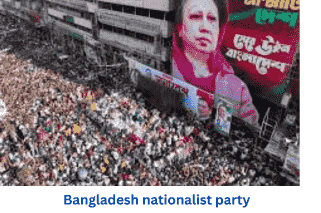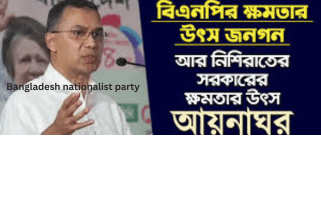The Bangladesh Nationalist Party (BNP) is one of the leading political parties in Bangladesh, established in 1978 by Zia Rahman, a former military officer and the country’s president from 1977 to 1981. The party has played a significant role in Bangladesh’s political landscape, positioning itself as a major force in opposition to the Aw League (AL), the country’s other dominant political party. The BNP’s ideology is largely based on nationalism, conservatism, and the protection of the country’s sovereignty and Islamic identity
, conservatism, and the protection of the country’s sovereignty and Islamic identity. Over the years, the party has been involved in both government and opposition, often with contentious political battles and significant controversy.
**Foundation and Early Years**

The formation of the BNP came in the aftermath of the 1975 assassination of Bangladesh’s founding father, Sheikh Mujib Rahman, which led to a period of political instability. Zia Rahman, who had been a prominent military leader during the Liberation War of 1971, assumed power in a 1975 coup following Mujib’s death. Initially, Rahman ruled as a military leader but later transitioned to a civilian role, founding the BNP as a political vehicle to legitimize his rule. The BNP quickly became the party of the country’s military and security establishment, attracting a strong base of support from conservative and nationalist segments of the population.
**Political Ideology and Nationalism**
The BNP’s political ideology is centered on Bangladeshi nationalism, which emphasizes the country’s sovereignty, territorial integrity, and pride in its Liberation War history. The party’s platform typically advocates for a stronger military, a greater role for Islam in governance, and a commitment to maintaining Bangladesh’s independence from foreign influence, particularly from India and the West. The BNP’s position on Islam is more conservative compared to its rival, the Awa League, and the party has traditionally had close ties to religious groups, including the Jamaat-e-Islam party.
The BNP’s nationalism also manifests in its commitment to the legacy of the country’s independence struggle, emphasizing the sacrifices made by the Bengali people during the 1971 Liberation War. However, the party has been accused of downplaying the role of the Awa League in the war, as well as defending individuals associated with war crimes, particularly members of Jamaat-e-Islam leading to contentious political divides in the country.
**Role in Government and Opposition**
Over the decades, the BNP has alternated between governing and being in opposition. It first came to power in 1979 after winning national elections, and Zia Rahman served as president until his assassination in 1981. His widow, Zia, became the leader of the BNP and the country’s first female prime minister in 1991. Under Begum Zia’s leadership, the BNP led the government through two non-consecutive terms (1991–1996 and 2001–2006). Her tenure was marked by efforts to modernize the economy, but also by significant political polarization, as the BNP frequently clashed with the Awa League.
The BNP’s period in opposition has been equally tumultuous. After being ousted from power in 2006, the party faced internal divisions and increasing public discontent, especially due to allegations of corruption involving party leaders, including Begum Zia. In recent years, the party has struggled to regain political influence, partly due to a lack of unity and ongoing rivalry with the Awa League, led by Prime Minister Sheikh Hasina, the daughter of Sheikh Mujib Rahman.
**Current Challenges**
The BNP today faces significant challenges. It is largely sidelined in the government, with the Awa League maintaining tight control over political power. The party has often accused the ruling party of undermining democracy, curtailing political freedoms, and using the judicial system to target opposition leaders Begum Zia, the party’s leader, has been embroiled in legal cases and has faced imprisonment, further complicating the BNP’s political prospects.
Despite these challenges, the BNP remains an important force in Bangladesh’s politics, with a strong base of support, particularly in rural areas and among conservative voters. However, its future depends on overcoming internal divisions, rebuilding its leadership, and addressing the growing political and economic issues facing the country.(Bangladesh Nationalist Party)
In conclusion, the Bangladesh Nationalist Party continues to be a central player in the country’s political theater, with a long history of both governance and opposition. Its influence is likely to persist, but its ability to adapt to Bangladesh’s changing political landscape will determine its future.(Bangladesh Nationalist Party)
বিএনপি(Bangladesh Nationalist Party)

বিএনপি, বাংলাদেশের প্রধান দুটি রাজনৈতিক দলের একটি। বাংলাদেশ ন্যাশনালিস্ট পার্টির সংক্ষিপ্ত রূপ বিএনপি নামেই পরিচিত এই দলটি। বাংলায় ‘বাংলাদেশ জাতীয়তাবাদী দল’। ১৯৭৮ সালের ১ সেপ্টেম্বর এই দলটি প্রতিষ্ঠা করেন সাবেক সেনাপ্রধান ও রাষ্ট্রপতি জিয়াউর রহমান।
১৯৭৬ সালে Zia Rahman রাষ্ট্রীয় ক্ষমতায় আসীন হন। এরপর ১৯৭৭ সালে তাঁর শাসন বেসামরিক করার লক্ষ্যে ১৯ দফা কর্মসূচি প্রণয়ন করেন এবং তিনি রাষ্ট্রপতি নির্বাচন করার লক্ষ্যে জাতীয়তাবাদী গণতান্ত্রিক দল (জাগ দল) প্রতিষ্ঠা করেন। বিচারপতি আবদুস সাত্তার ছিলেন এ দলের সমন্বয়ক। পরবর্তী সময়ে ১৯৭৮ সালের ১ সেপ্টেম্বর জাগ দল বিলুপ্ত করে বিএনপি প্রতিষ্ঠা করা হয়। জিয়াউর রহমান ছিলেন এ দলের চেয়ারম্যান। প্রতিষ্ঠাকালীন এ দলের উল্লেখযোগ্য বৈশিষ্ট্য ছিল ডান, বাম ও মধ্যপন্থীদের সমন্বয়। ১৯৭৯ সালে এ দল থেকে নির্বাচন করে জিয়াউর রহমান রাষ্ট্রপতি নির্বাচিত হন।
১৯৮১ সালে জিয়াউর রহমান কিছু বিপথগামী সেনাসদস্যের হাতে নিহত হন। এর পর এই দলের সভাপতি নির্বাচিত হন বিচারপতি আবদুস সাত্তার। এইচ এম এরশাদের সামরিক শাসন চলাকালে ১৯৮৪ সালে বিএনপির চেয়ারপারসন নির্বাচিত হন Begum Zia.এরশাদবিরোধী আন্দোলনে বলিষ্ঠ ভূমিকা ছিল দলটির। এ সময় বিএনপির নেতৃত্বে সাতদলীয় জোট সক্রিয় ভূমিকা রাখে।
এরশাদ সরকারের পতনের পর ১৯৯১ সালের জাতীয় নির্বাচনে বিজয়ী হয়ে সরকার গঠন করে বিএনপি। এরপর ২০০১ সালের নির্বাচনেও বিএনপি জয়ী হয়ে সরকার গঠন করে। এর মধ্যে ১৯৯৬ সালে এই দলটি একতরফা বিতর্কিত নির্বাচন করে কিছু দিনের জন্য সরকার গঠন করেছিল।
১৯৯৬ এবং ২০০৮ সালের জাতীয় নির্বাচনে বিজয়ী হয়ে আওয়ামী লীগ সরকার গঠন করলে ওই দুই মেয়াদে জাতীয় সংসদের বিরোধী দল ছিল বিএনপি।
আওয়ামী লীগের অধীনে ২০১৪ সালের ৫ জানুয়ারির বিতর্কিত নির্বাচন বর্জন করে বিএনপি।বিএনপির প্রতিষ্ঠাতা ও সাবেক রাষ্ট্রপতি জিয়াউর রহমান ও সাবেক প্রধানমন্ত্রী বিএনপির চেয়ারপারসন খালেদা জিয়া দম্পতির বড় ছেলে Tarek Rahman ২০০৯ সালে দলের পঞ্চম কাউন্সিলে তিনি বিএনপির সিনিয়র ভাইস চেয়ারম্যানের দায়িত্বপ্রাপ্ত হন। (Bangladesh Nationalist Party)








